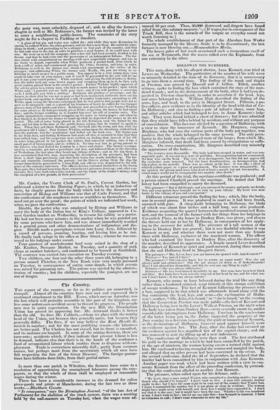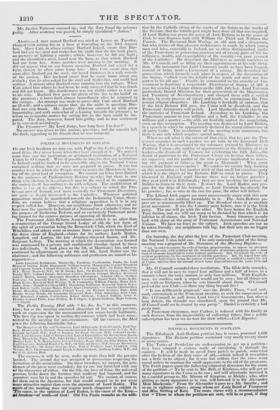HOLLOWAY THE MURDERER.
This man, along with his alleged abettor, Anne Kennett, was tried at Lewes on Wednesday. The particulars of the murder of his wife were so minutely detailed at the time of its discovery, that it is unnecessary to go into them a second time. The finding of the trunk and thighs at Preston, was proved by Muscall and J. Gillon. Elfick, another witness, spoke to finding the box which contained the stays of the mur- dered female ; and to the disinterment of the body, after it had been de- posited in Preston churchyard, in order to ascertain if the head, legs, and arms belonged to it. William Muit described the finding of the arms, legs, and head, in the privy in Margaret Street. Pilbeam, a po- lice-officer, gave evidence as to the identity of the head with that of Ce- lia Holloway ; and also to finding a pair of infant's shoes, some lace, and other articles which had belonged to her, in Anne Kennett's lodg- ings. They were found behind a chest of drawers ; but it was admitted that they might have fallen behind by accident, and without any purpose of concealment. This fact was elicited by a question of HolloWay, with a view to show the innocence of Kennett. Mr. Hargrave, surgeon, Brighton, who had seen the various parts of the body put together, was positive that the whole belonged to the same person. The. only pecu- liarity in the body was the collapsed state of the lungs ; from which Mr. Hargrave inferred, that death had been caused by strangulation or suffo- cation. • On cross-examination, 31r. Hargrave described very minutely the appearance of the body- " The features were discernible. The body had been steeped in water, and was con- sequently pale. It was not in a state of putridity. Decomposition hind not commenced. No hair was on the head. Tim eyes were decomposed ; but this did not appear till the eyelashes were removed. Not the least diseolouration, or decomposition, had taken place in the nostrils. There was uo colour in the thee. It was like a sheet of whitish-yellow paper, or a piece of parchment. The features were recognizable. In my opinion the person must have been dead at least a mouth, but not two months. A countenance would not be recognizable two months after death."
At this period of the trial, the marriage-certificate was produced ; and a person named Chatfield proved the marriage. He demed that Hol- loway had been compelled to marry the deceased.
The prisoner—" But it did though, and you advanced the money, and made me drunk. You and your parish have brought me to ruin by your villainy. My heart was near broke by the villany of you and your parish."
Different witnesses proved the finding the box ; which, like the body, was in several pieces. It was produced in court as it had been found, smeared with gore. A clasp-knife belonging to Holloway, the blade of which was about four inches and a half long, was also produced. Evidence respecting the quarrel between the murdered woman and Ken- nett, and the removal of the former with her things from her lodgings in Cavendish Place, to the house in Donkey Row, was given ; and also to the threats held out to her by Holloway, in consequence of her apply- ing to the overseer for relief. The presence of a tall woman at the house in Donkey Row was proved ; but it was doubtful whether it was Kennett or not, and whether there were not more than one female there with Holloway, exclusive of the murdered woman. The officer who had examined the house in Donkey. Row, after the discovery of the murder, described its appearance. A female named Lever described the conduct of Kennett as quiet and good-natured, during three months that she and Holloway lived in Margaret Street.
The prisoner—" Mrs. Lever, have you not known-me quarrel with Ann Kennett ?" Witness—" Yes, indeed I have."
The-prisoner—" Did you ever know her to return an angry word ? Was she not always mild and submissive ? Did she not always sit down as if brokenhearted? Have I not abused her shamefully, and did she ever say any thing in reply?"
Witness—" She was always submissive."
Prisoner—" She has been bruised dreadffilly by me. tier arms have boot beat black and blue. Her hairs have been actually torn out of her head by me, and for what rea- son I don't know : it was my savage nature."
Kennett, who seems to have behaved during the trial like any thing rather than a hardened criminal, wept bitterly at this strange exhibition of savage tenderness. The fact of Kennett following the prisoner with a box, supposed to be that which was afterwards found along with the lug containing the head, legs, and arms—the exclamation of Hollo- way's mother, " Oh, John, it is found," or "she is found," on the evening that the discovery at Preston was made public—the fact of Kennett and Holloway bci,i seen in the Lover's Walk at Preston, on the night when the body was taken from Donkey. Row—were severally sworn to, amidst considerable interruptions from Holloway. Previous to the confessions of the latter hieing put in, the Judge suggested the propriety of the Jury coming to a decision respecting the guilt or innocence of Kennett, as the declarations of Holloway, however good against himself, were no evidence against her. The Jury, after the Judge bind summed up the evidence against her, acquitted her of the capital charge; and she was removed to wait the filling up of a new indictment. The confeSsions of Holloway were then read. The first attributed his guilt to the marriage to which be had been compelled by the parish, at the age of nineteen, the woman having soon a natural child against him. He confessed to having strangled the woman and mangled the body, and alleged that no other person had been concerned in the crime. In the second confession, dated the 3d of September, he declared that the murder had been committed by him in conjunction with Ann Kennett. Another paper was read, which had been written with a view to exo- nerate Kennett from the effect of the preceding confession, by pretend- ing that the confession alluded to another Ann Kennett.
The prisoner, when called upon for his defence, said-
" :My Lord, since a man named Winter. who committed a shocking murder, was par- doned, why should I be hanged? I don't wish to live. A man who commits murder ought to die; but I have the same right to be sent out of the country that Winter had. I know I committed the murder, but it is not plain or clear in evidence. The woman might have made away with herself, and from fear I might have concealed it. I don't say that it is the case; but it might have been the case. Whether Celia was murdered or not, I don't wish to live ; but let me say only this—Ann Kennett is innocent. I have no witnesses to call; I don't want witnesses to save my life."
Mr. Justice Patteson summed up ; and the Jury found the prisoner guilty. After sentence was passed, he simply ejaculated " Amen."



























 Previous page
Previous page